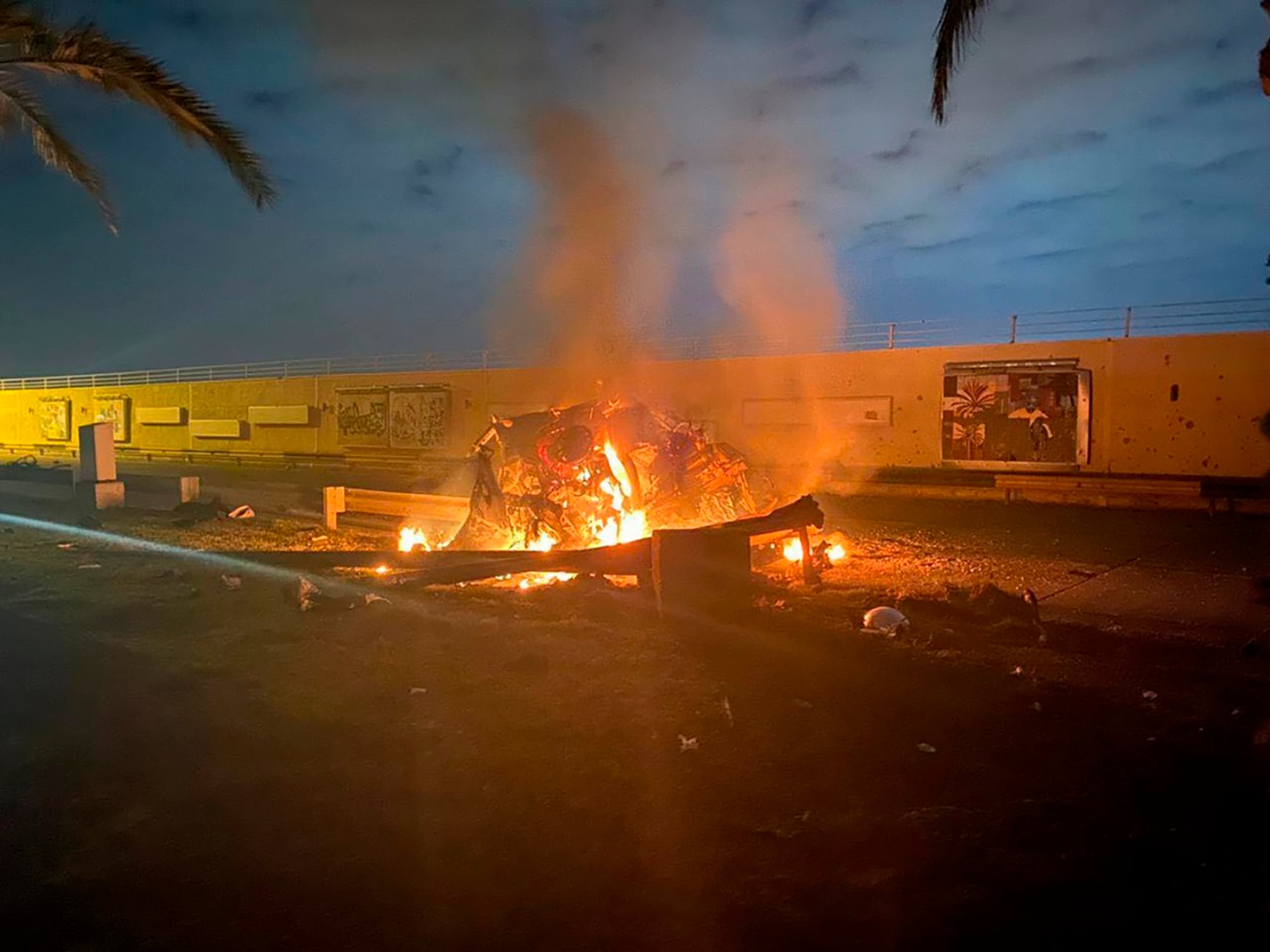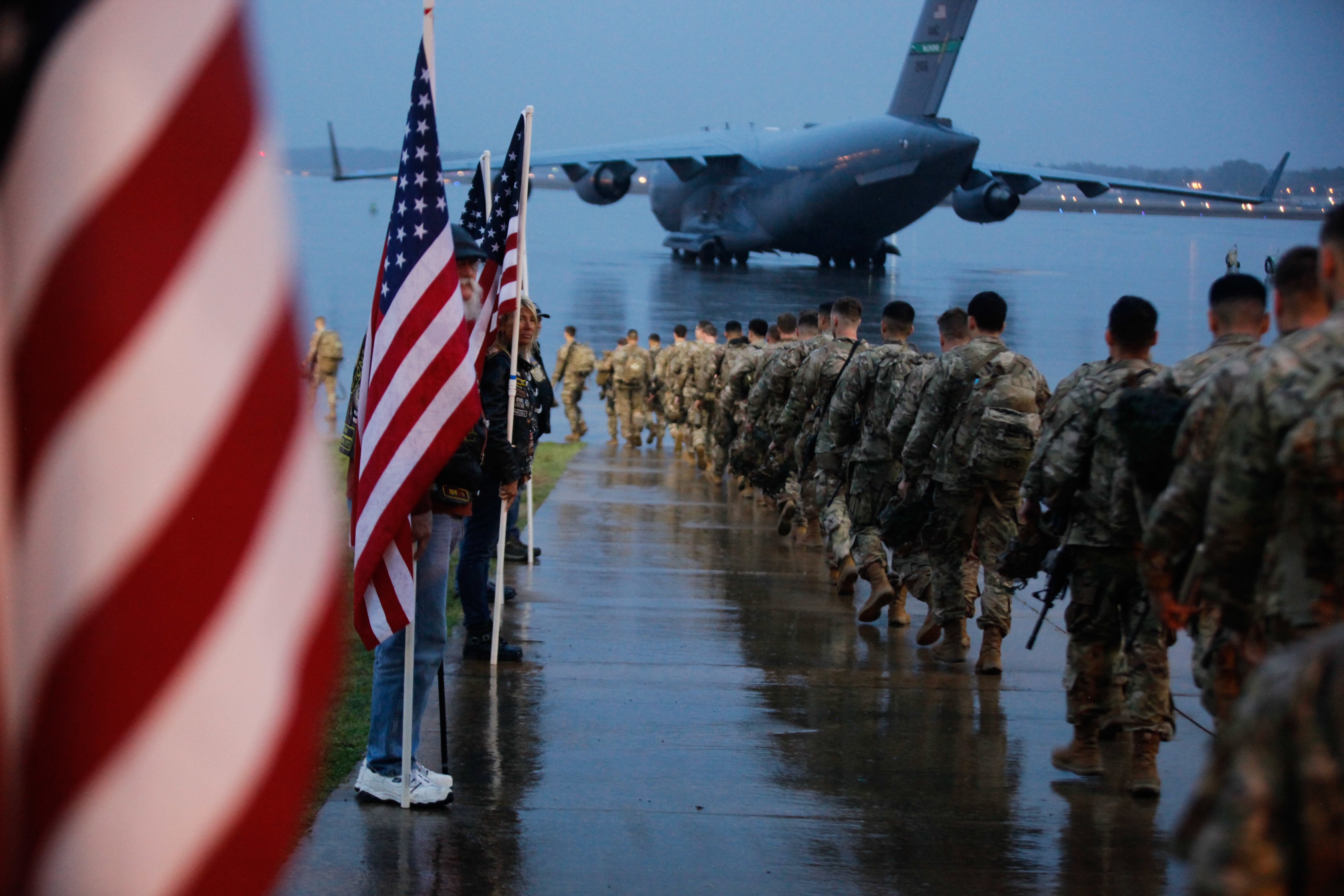President Donald Trump has upped the ante with his social media war against Tehran by threatening Iran that the U.S. military will “quickly & fully strike back, & perhaps in a disproportionate manner,” if the country attacks Americans.
Trump also noted his Sunday tweet served as a “notification” to Congress and that “such legal notice is not required."
Trump’s assertion on Twitter Sunday that he can use social media to inform Congress of future military actions against Iran is likely to cause further tensions between lawmakers and the White House in coming days, including potential legal actions.
The House Foreign Affairs Committee fired back a tweet telling Trump to read the 1973 War Powers Act — which was intended to serve as a check on the president’s power to commit forces to an armed conflict.
“This Media Post will serve as a reminder that war powers reside in the Congress under the United States Constitution. And that you should read the War Powers Act. And that you’re not a dictator," the House Foreign Affairs Committee tweeted Sunday.
Since Trump ordered an airstrike to kill Iranian Gen. Qassem Soleimani, the head of an elite arm of Iran’s Islamic Revolutionary Guard Corps, on Iraqi soil last week, Democratic lawmakers have complained publicly that the move may violate the executive branch’s authorities for the use of military force.
They also lamented the lack of advance notification by the White House regarding the attack, traditionally given to key congressional leaders such as the Speaker of the House and heads of the congressional armed services committees.
Republican defenders of Trump largely ignored the slight, noting that the president has broad powers regarding military actions in defense of national security.
RELATED

But Democrats have promised investigations into whether proper protocols were followed. All lawmakers are expected to receive a classified briefing on the Soleimani killing sometime next week.
Under the War Powers Resolution in 1973, the president is required to notify Congress within 48 hours of any military action and prohibits the president from continuing that action for more than 60 days without an authorization for use of force from Congress.
It specifies that lawmakers must be informed “in writing, setting forth … the constitutional and legislative authority under which such introduction took place, and the estimated scope and duration of the hostilities or involvement.”
The law also requires the president to “provide such other information as the Congress may request in the fulfillment of its constitutional responsibilities with respect to committing the nation to war and to the use of United States Armed Forces abroad.”
Different presidents have interpreted those requirements in different ways, especially since Congress approved a pair of broad military force authorizations in the wake of the Sept. 11, 2001, attack
While Sen. Lindsey Graham, R-S.C., on Saturday Tweeted out that Trump, "as Commander in Chief has the authority and obligation to protect American forces in harm’s way, one legal expert challenged the legality of Trump’s announcing policy fiat by social media.
Oona Hathaway, director of Yale Law School’s Center for Global Legal Challenges, said the president’s message “threatens to break several laws,” including the notification issues and the promise of a “disproportionate” response to any attack.
All members of Congress are expected to return to Capitol Hill after their extended holiday break on Monday and Tuesday.
As lawmakers and the White House trade barbs over legal issues related to war, Iran and the U.S. appear to be entering an escalatory conflict spiral that could pull the two countries into a broader war and complicate efforts to ameliorate tensions.
On Saturday Trump tweeted that the U.S. military would target 52 Iranian sites, including cultural sites, if Iran retaliated for the death of its revered commander.
In an interview with CNN, Hossein Dehghan, a military adviser to Iran’s Supreme Leader Ayatollah Ali Khamenei, said that Iran’s response to America’s Jan. 2 decapitation strike against Quds Force commander Qassem Soleimani will be military “against military sites.”
“The United States just spent Two Trillion Dollars on Military Equipment. We are the biggest and by far the BEST in the World! If Iran attacks an American Base, or any American, we will be sending some of that brand new beautiful equipment their way...and without hesitation!,” Trump tweeted Sunday.
The Iraqi parliament, upset over the death of Soleimani, voted in a non-binding referendum Sunday to end the agreement that allowed U.S. troops to assist Iraqi forces in their fight against ISIS.
U.S. Secretary of State Mike Pompeo dismissed the Iraqi Parliament’s vote Sunday that called for U.S. troops to leave their country.
“We are confident that the Iraqi people want the United States to continue to be there to fight the counterterror campaign. And we’ll continue to do all the things we need to do to keep America safe," Pompeo said on “Fox News Sunday.
RELATED

The U.S.-led coalition combating ISIS in Iraq and Syria announced Sunday that U.S. troops were pausing anti-ISIS operations and suspending the training of Iraqi troops as threats to coalition troops housed at Iraqi bases continued unabated.
“As a result we are now fully committed to protecting the Iraqi bases that host Coalition troops. This has limited our capacity to conduct training with partners and to support their operations against Daesh and we have therefore paused these activities, subject to continuous review,” the coalition said in a news release.
There have been more than a dozen rocket attacks against Iraqi bases housing coalition troops in Iraq over the last two months. U.S. officials have fingered an Iran-backed militia as responsible for the attacks.
A Dec. 29 series of airstrikes against the Iran supported militia precipitated demonstrations at the U.S. Embassy in Baghdad, condemnation from the Iraqi government and the subsequent U.S. drone strike that killed Soleimani.
The U.S. and Iran appear to be entering a heated proxy war.
Shawn Snow is the senior reporter for Marine Corps Times and a Marine Corps veteran.
Leo covers Congress, Veterans Affairs and the White House for Military Times. He has covered Washington, D.C. since 2004, focusing on military personnel and veterans policies. His work has earned numerous honors, including a 2009 Polk award, a 2010 National Headliner Award, the IAVA Leadership in Journalism award and the VFW News Media award.



